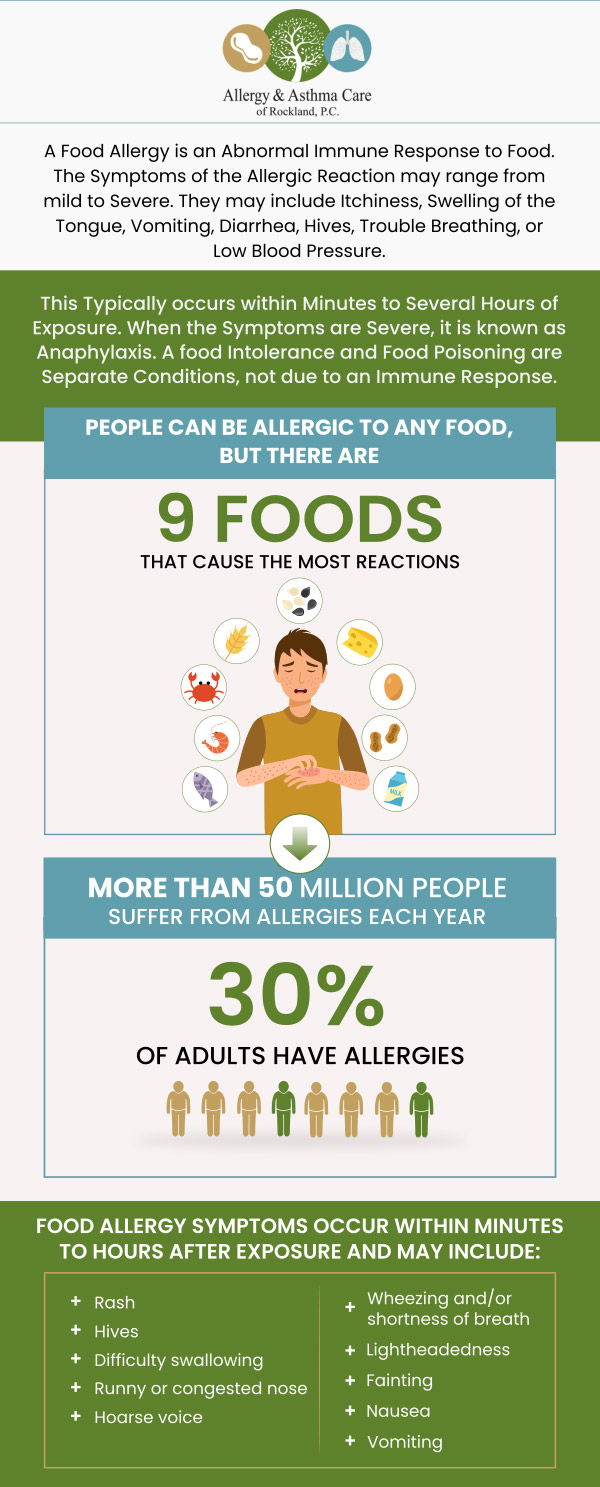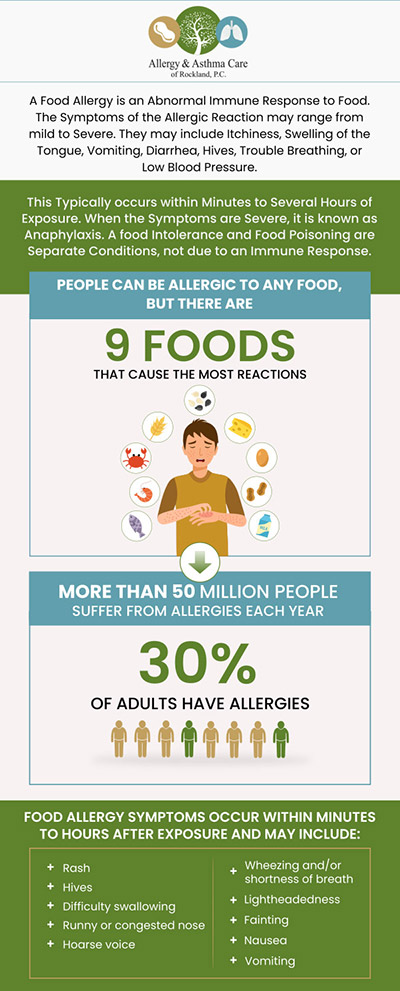Food Allergy Treatment Specialist Q&A
If you or someone you know is suffering from food allergies, visit Allergy & Asthma Care Rockland where our specialist will conduct tests to diagnose allergies and provide comprehensive treatment. For more information, contact us or book an online appointment. We have convenient locations to serve you in Suffern, NY and Monroe, NY.




Table of Contents:
Are food allergies genetic?
What are the most common food allergies?
How do I know what foods I am allergic to?
How long does it take for an allergic reaction to food to go away?
There have been studies that have shown that food allergies can be passed down from parent to child. If one parent has allergies then one-third to one-half of the children will be predisposed to allergies. If both parents are involved, then up to two-thirds of children could be affected.
While you can be allergic to any kind of food, the most common food allergies seen in 90% of our patients include:
– Milk
– Eggs
– Peanuts
– Soy
– Wheat
– Tree nuts
– Fish
– Shellfish
– Sesame
Allergic reactions to these common foods can be mild to severe. Even if a previous reaction had been quite mild, a subsequent reaction can be quite severe and can land you in the hospital. The symptoms that can occur during an allergic reaction to food include:
– Wheezing
– Difficulty breathing
– Coughing
– Hoarseness
– Throat tightness
– Stomach pain
– Vomiting
– Diarrhea
– Swollen, itchy, and watery eyes
– Hives
– Swelling
– Feeling lightheaded, loss of consciousness, and drop in blood pressure
A proper evaluation starts with a comprehensive history of previous reactions as well as a detailed physical exam. Allergy skin and/or blood testing will likely be recommended based upon the history. Often time the diagnosis is straightforward, but sometimes the diagnosis is not so clear. In these cases, an oral challenge may be recommended.
The major food allergies seen in adults are found primarily in:
– Shellfish which includes shrimp, lobster and crab
– Peanuts
– Tree nuts which include walnuts, cashews and hazelnuts
– Fish
In children however, these triggers are often associated with proteins found in the following foods:
– Peanuts
– Tree nuts
– Eggs
– Cow’s milk
– Wheat
– Soy
While not all allergies are immediately connected to a specific food item, like the ones listed above, there are other food allergies that are found primarily in patients with seasonal allergies. Various fresh fruits and vegetables, nuts, and spices can trigger itching in the throat and mouth, a condition referred to as the Oral Allergy Syndrome.
Intolerance to food is oftentimes confused with food allergy. Food allergies always involve the immune system with Immunoglobulin E (IgE) playing a central role in the development and presentation of food allergy symptoms. Food intolerances, however, can often provoke digestive complaints like bloating, diarrhea or an upset stomach. Most often the symptoms from food intolerances are not life-threatening. Classic examples of food intolerance are lactose intolerance and gluten sensitivity.
Allergic reactions to food normally usually present within minutes but can be delayed up to two hours. Ingesting the food is what triggers the reaction, in most cases. However, there are situations that we have seen where just having any skin contact or breathing in the food allergen can cause severe symptoms to occur.
Even after the first symptoms have gone, there can still be a second wave of symptoms that could be worse than the first. That is why patients who experience any reaction to food, should contact the doctor or call for emergency services. Individuals who do suffer from severe reactions to this second wave of food allergies will often need to be cared for in the ER or hospital.
If you are noticing certain symptoms of food allergies after ingesting certain foods, contact Allergy & Asthma Care Rockland for food allergy testing and treatment appointments. We serve patients from Suffern NY, Monroe NY, New City NY, Spring Valley NY, Monsey NY, Airmont NY and Mahwah NJ.

Additional Family Care Services You May Need

Additional Family Care Services You May Need





